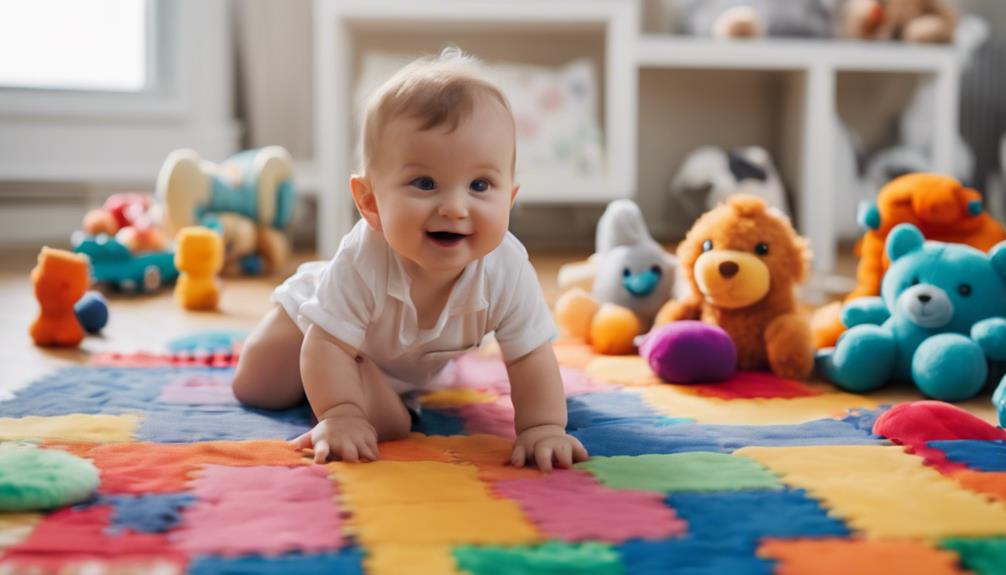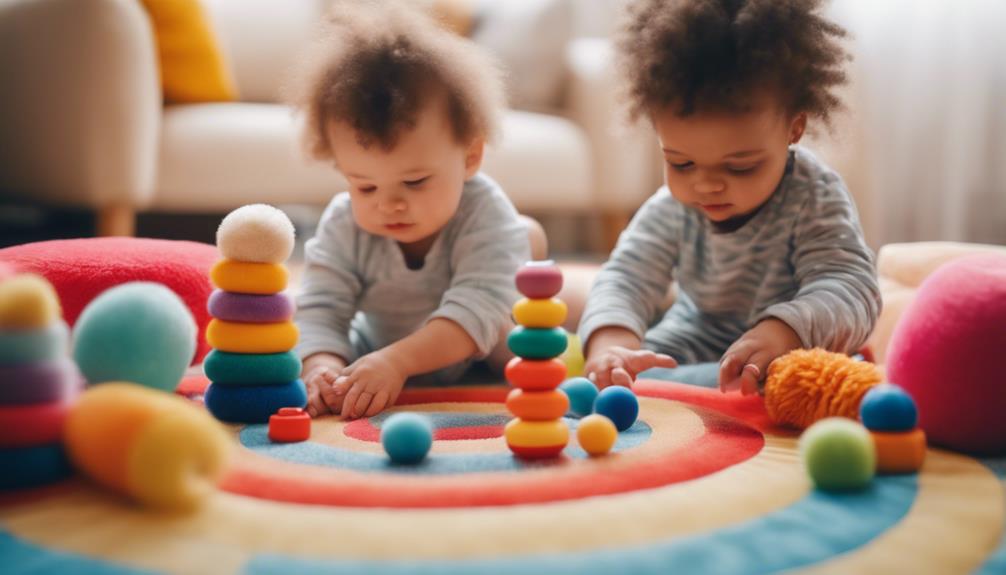Engage in fun and educational baby brain games. Mirror play enhances self-awareness and social skills. Texture exploration improves tactile senses and curiosity. Block games develop cognitive and motor skills. Peek-a-boo promotes cognitive growth and bonding. Rhyming and singing support language skills. Face recognition stimulates cognitive development. Hand-eye coordination refines essential skills. Cause-and-effect play encourages problem-solving abilities. These activities promote cognitive growth and enhance connections with caregivers. Explore more about these fascinating games.
Key Takeaways
- Mirror play supports self-recognition and social development.
- Texture exploration stimulates touch, curiosity, and sensory skills.
- Block games enhance cognitive and motor skills through natural interaction.
- Peek-a-boo fosters cognitive skills and object permanence understanding.
- Rhyme and sing develop language, literacy, and cognitive growth.
Mirror Play
Engage your baby in mirror play to support their self-recognition and social development. Mirror play involves introducing your little one to their reflection, allowing them to explore facial expressions, emotions, and body movements. This activity not only captivates babies as young as 6 months old but also plays an important role in their cognitive development. By interacting with their own image, infants can enhance self-awareness and even strengthen the bond between caregivers and babies.
Through mirror play, your baby can begin to recognize themselves in the reflection, laying the foundation for self-recognition. As they observe their movements and expressions in the mirror, they start to understand their own actions and emotions. This process is essential for their social development, as it helps them grasp the concept of self and others.
Encouraging mirror play sessions can provide a fun and educational experience for your little one, fostering their growth and understanding of the world around them.
Texture Exploration

Exploring different textures through play is a vital way to help babies learn about tactile sensations and develop sensory skills. Engaging in touch and feel games with various fabrics and materials stimulates your baby's sense of touch and curiosity, laying a strong foundation for their sensory awareness.
By participating in activities that involve texture exploration, your little one isn't only having fun but also enhancing their cognitive development. These experiences provide valuable sensory input for your baby's brain development, supporting their sensory processing abilities as they grow.
Simple yet effective texture exploration games can make a significant impact on your baby's sensory development, offering them the opportunity to learn and explore the world through touch. Encouraging your baby to engage with different textures won't only be an enjoyable experience for them but will also play an essential role in their overall sensory and brain development.
Block Games
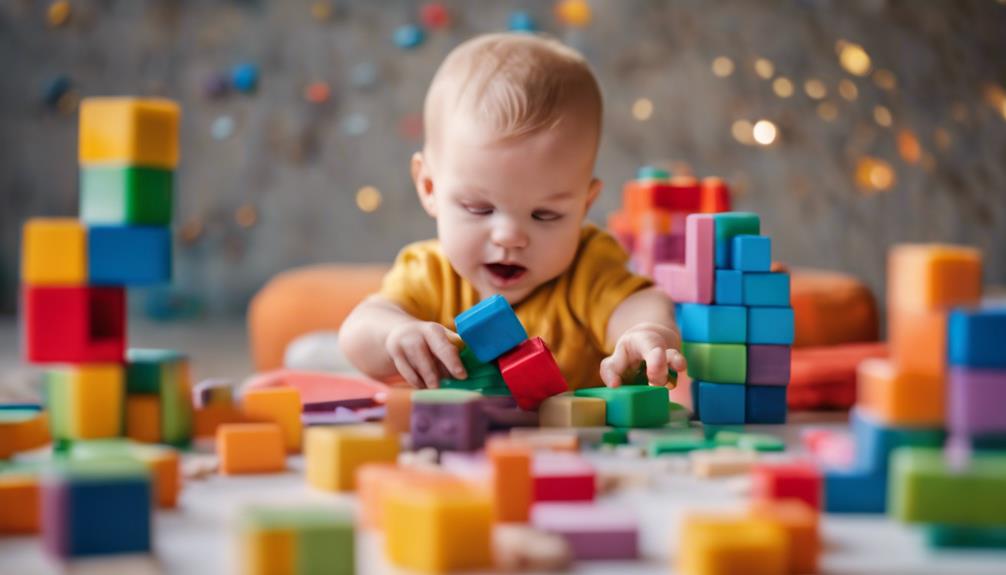
Playing block games with your baby can greatly enhance their cognitive and motor skills. These brain-boosting activities not only improve hand-eye coordination but also help teach cause and effect relationships through play.
When your baby engages in stacking blocks, they're actively participating in activities that support their cognitive development. The simplicity of block games allows for natural interaction and learning, making it an enjoyable experience for both you and your little one.
Peek-a-boo Fun

Peek-a-boo isn't just a game; it's a key tool for your baby's development.
By playing peek-a-boo, you're helping your little one grasp the concept of object permanence.
This classic game fosters cognitive skills and strengthens the bond between you and your baby.
Peek-a-boo Benefits
Discover how Peek-a-boo enhances your baby's cognitive development and strengthens the bond between you and your little one. Playing Peek-a-boo with your baby supports their understanding of object permanence and memory skills. This classic game isn't just about giggles; it actually aids in your baby's cognitive growth and encourages social interaction. The joy and laughter shared during Peek-a-boo sessions also foster a stronger bond between you and your baby.
Even babies as young as 4-7 months old can start enjoying the benefits of playing Peek-a-boo. Engaging in this simple yet important game helps your baby grasp the concept that things exist even when they're out of sight. By repeatedly revealing your face after hiding, you're helping your baby's brain make connections and develop essential cognitive abilities.
Interactive Play Ideas
Engage your baby's curiosity and stimulate their development with interactive play ideas that promote cognitive growth and strengthen your bond.
One fantastic way to do this is through the classic game of peek-a-boo. Playing peek-a-boo with your little one not only brings joy and laughter but also helps them build language skills and understand object permanence. By hiding and revealing your face or objects, you're teaching your baby that things still exist even when they're out of sight. These simple and repetitive peek-a-boo activities support cognitive development in infants by engaging them in learning these fundamental concepts.
Moreover, peek-a-boo encourages social interaction and communication between caregivers and babies, fostering a strong emotional connection. The back-and-forth nature of the game promotes turn-taking and can even lead to the development of early language skills.
Rhyme and Sing
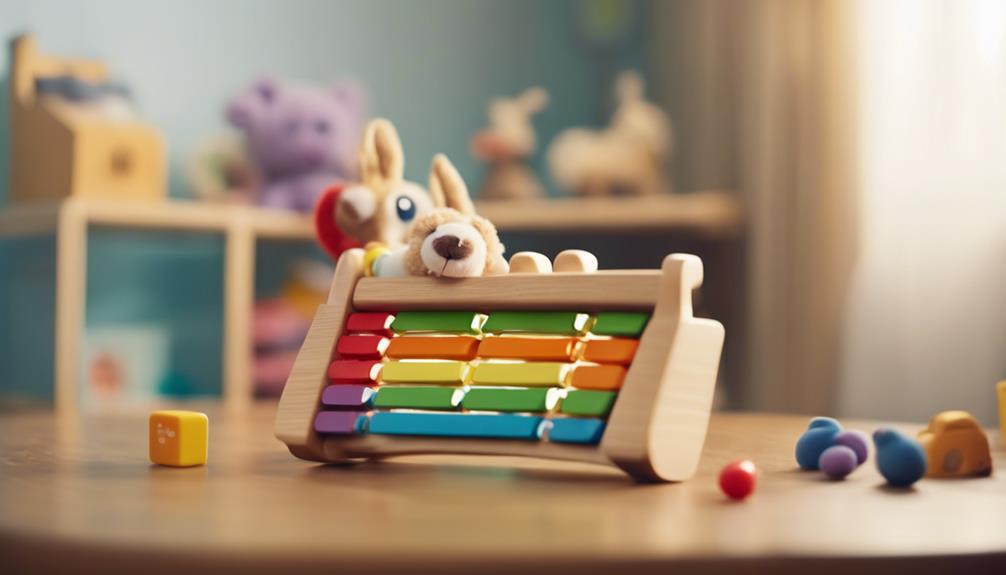
Enhancing your baby's language skills can be achieved through engaging in rhyme and sing activities. These activities not only provide entertainment but also help your baby's brain develop essential language skills.
Here's why rhyme and sing activities are beneficial for your little one:
- Phonological Awareness: Rhyming and singing with babies help them develop phonological awareness, which is vital for language development. By engaging in these activities, babies learn to recognize and manipulate sounds in words, setting a strong foundation for their language skills.
- Language and Literacy Skills: Introducing babies to rhyming books supports language and literacy skills. Reading books with rhymes exposes babies to new words and concepts, expanding their vocabulary and understanding of language.
- Cognitive Growth: Rhyme and sing activities aid cognitive growth by engaging babies in language development. These activities support early cognitive development by enhancing language skills, stimulating the brain, and fostering a love for language and communication.
Face Recognition
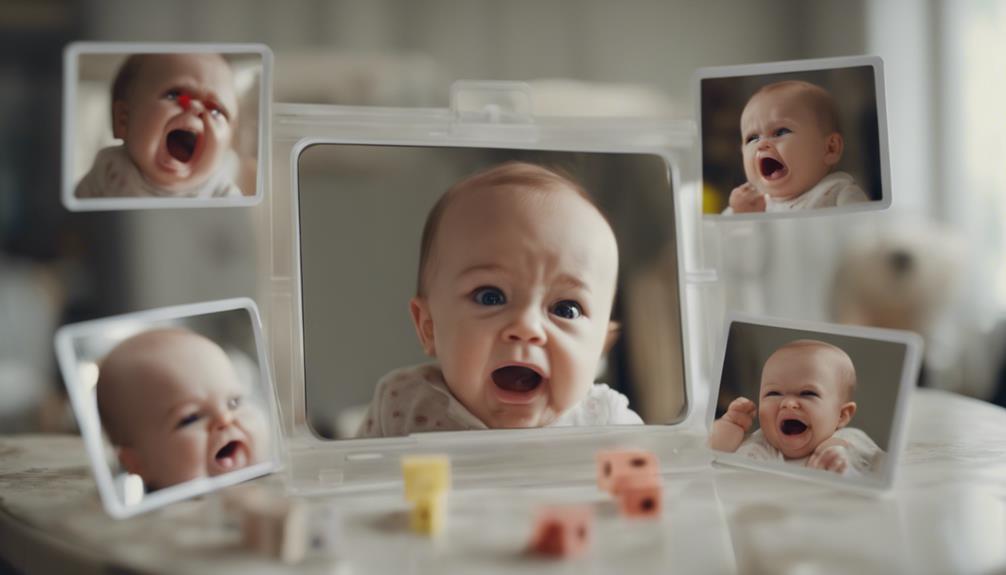
Babies demonstrate an innate preference for faces shortly after birth, indicating early development of facial recognition skills. This ability plays a vital role in cognitive growth and can be further enhanced through engaging activities.
Playing games involving faces not only entertains babies but also aids in their cognitive development. Simple interactions, like face-to-face play with caregivers, help strengthen facial recognition abilities. By gazing at faces, infants support their visual development and promote cognitive growth.
These early skills in facial recognition lay a foundation for more advanced social interactions later in life. Encouraging babies to focus on faces through games and interactions is a fun and effective way to support their learning and development.
Hand-eye Coordination
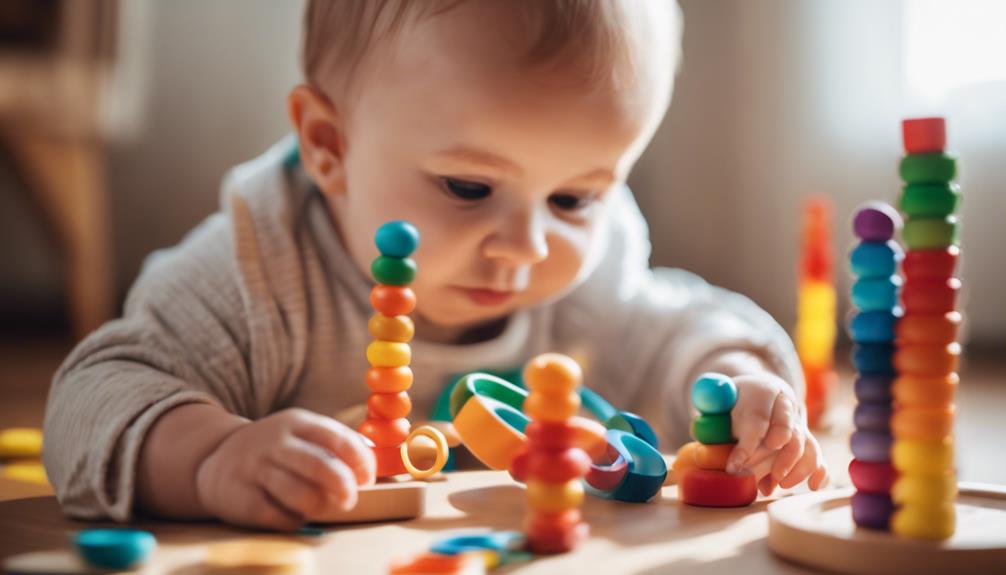
To further support your baby's cognitive development, focusing on activities that improve hand-eye coordination is crucial. Boost your baby's brain by engaging in fun and educational games that enhance this essential skill.
Here are some activities that can help improve your baby's hand-eye coordination:
- Stacking Blocks: Encourage your baby to stack blocks of varying sizes to enhance their hand-eye coordination skills. This activity helps them learn how to coordinate their hand movements with their visual perception.
- Grasping and Releasing Toys: Provide toys that require your baby to grasp and release objects. This action helps refine their hand-eye coordination as they learn to control their hand movements.
- Catching and Throwing Soft Balls: Engage in gentle games of catching and throwing soft balls with your baby. This activity not only improves their hand-eye coordination but also enhances their motor skills.
Cause-and-effect Play
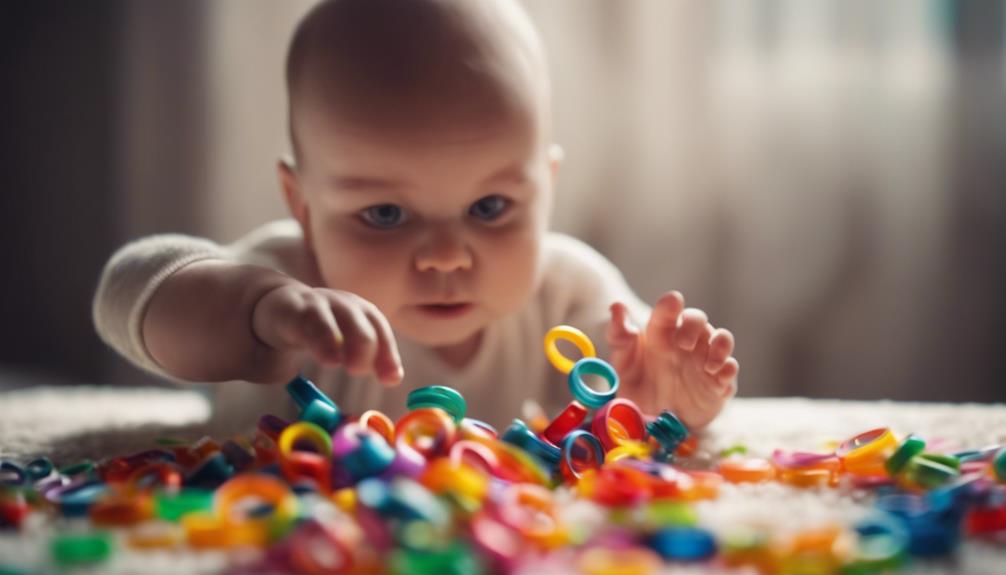
Playing cause-and-effect games with babies is vital for stimulating cognitive development and encouraging problem-solving skills.
These activities, such as dropping a toy to see it fall, help babies understand the relationship between actions and outcomes.
Stimulating Cognitive Development
Engaging in cause-and-effect play with your baby can greatly enhance their cognitive development. This type of play helps babies understand the relationship between their actions and the outcomes they produce.
Here are three ways cause-and-effect play can boost your baby's brain:
- Developing Problem-Solving Skills: By engaging in activities like stacking blocks or pressing buttons that lead to a reaction, babies learn to anticipate results and problem-solve when things don't go as planned.
- Enhancing Curiosity and Learning: Simple cause-and-effect games capture babies' attention and spark their curiosity as they observe the cause leading to a specific effect, encouraging them to explore and learn.
- Laying the Foundation for Logical Thinking: Understanding cause and effect from a young age sets the stage for logical thinking and decision-making skills to develop as babies grow older.
Encouraging Problem-Solving Skills
Understanding cause-and-effect relationships through play is key to fostering problem-solving skills in infants. Cause-and-effect play, such as hitting blocks together, allows babies to grasp the connections between their actions and the resulting outcomes. These simple activities serve as building blocks for problem-solving abilities by demonstrating how different actions lead to specific reactions.
By engaging in cause-and-effect games, infants not only enhance their hand-eye coordination but also promote cognitive development.
During a baby shower, consider gifting toys or games that encourage cause-and-effect exploration. Toys that produce sounds when pressed or toys that light up when buttons are pushed are excellent choices. These sensory experiences help babies learn about cause and effect, supporting their cognitive growth and understanding of the world around them.
Sensory Stimulation

Exploring different textures through touch aids babies in developing their sense of touch and understanding their surroundings. Engaging in sensory stimulation activities can greatly enhance your baby's brain development.
Here are three ways sensory stimulation benefits your little one:
- Encourages Exploration: Sensory play allows babies to interact with different textures, temperatures, and materials, promoting curiosity and exploration of their environment.
- Supports Cognitive Development: By stimulating their senses through activities like peek-a-boo games, babies enhance their cognitive skills, such as memory and understanding object permanence.
- Aids Language Development: Reading picture books to babies provides visual and auditory sensory stimulation, which not only aids in language development but also contributes to overall cognitive growth.
Incorporating sensory activities into your baby's routine can create enriching experiences that foster essential brain development and sensory skills necessary for their early learning journey.
Cognitive Development

To boost your baby's brain, promoting cognitive development in infants relies heavily on quality interactions with caregivers, like responding to your baby's coos and cries. These interactions create true back-and-forth exchanges essential for cognitive growth, such as engaging in parent-baby conversations and gazing into your baby's eyes.
Games such as 'Where's the cup?' not only aid memory milestones but also help babies grasp object permanence between 4-7 months, enhancing cognitive skills. Additionally, physical activities like tummy time, crawling, and walking practice are key in boosting brain growth and furthering cognitive development in babies.
Initiating games with toys, positively responding to your baby's gestures, and engaging in play also support social, emotional, and cognitive development in infants. By actively participating in these activities, you can play a significant role in nurturing your baby's cognitive abilities and overall brain development.
Frequently Asked Questions
What Kinds of Activities Help to Develop a Baby's Brain?
To develop a baby's brain, engage in back-and-forth interactions, play memory games, encourage physical activities like tummy time, read books with rhyming words, and have face-to-face interactions. These activities support cognitive, memory, and visual development.
What Are Memory Activities for Babies?
To enhance your baby's memory, try fun activities like 'Where's the cup?' and peek-a-boo. Reading picture books and exploring textures boost memory and language skills. Teaching cause and effect with blocks also aids memory development.
How to Encourage Intelligence in Babies?
To encourage intelligence in babies, engage in interactive play, read books with rhymes, and incorporate physical activities. Despite their age, babies can benefit from these simple yet effective ways to boost cognitive development and foster lifelong learning.
How Can I Stimulate My Baby's Cognitive Development?
To stimulate your baby's cognitive development, engage in back-and-forth interactions. Play games like 'Where's the cup?' for object permanence. Encourage physical activities like tummy time. Initiate play with toys. Read books with rhymes for language development.
Conclusion
To sum up, engaging your baby in brain games not only provides entertainment but also fosters educational development. Despite any initial skepticism, the benefits of these activities are backed by research and proven to enhance cognitive skills.
So, don't hesitate to incorporate these fun and enriching games into your daily routine. Your baby's brain will thank you for it!

